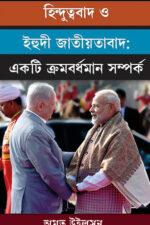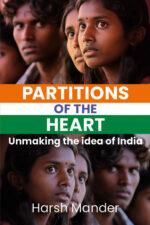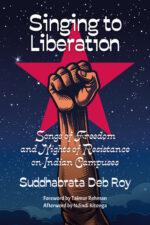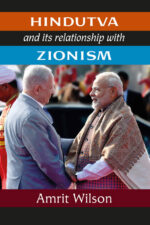-
Inutabada o iiuhadabadadara sade era samaraka (হিন্দুত্ববাদ ও ইহুদী জাতীয়তাবাদ : একটি ক্রমবর্ধমান সম্পর্ক)
This is a Bengali translation of Hindutva and its relationship with Zionism, by Amrit Wilson: ISBN 978-1-990263-76-7. Written in December 2022, this text is based on a lecture given earlier at the invitation of the Institute of Palestine Studies. Since then, the relationship between Israel and India has deepened further and atrocities have skyrocketed in both countries. On 5 April 2023, Israeli forces stormed Al Aqsa Mosque compound in occupied East Jerusalem and attacked worshippers inside. At the same time, Israel is facing internal turmoil in a battle between a diverse group, including those who think the current settler colony is a democratic nation and want things to remain as they are, and those who stand even further to the right. Significantly, the BJP, India’s ruling party, supports the latter. This book is about Hindutva, the ideology which drives the Hindu-supremacist Bharatiya Janata Party (BJP) regime of Prime Minister Narendra Modi, and Zionism, the ideology of the Israeli apartheid state. In this era of rising fascism, these two remarkably similar ideologies are crucially important in cementing the economic and military alliance between two of the world’s most repressive right-wing states – while helping to legitimize them in cultural arenas. Israel is, of course, a settler colonial state, but it is also, like India, a fascist state, not only because of ‘the extremist parties that [are] part of the government’ but also because of ‘their enablers – Netanyahu and his chauvinistic Likud party which long strove for a Jewish state dominating both sides of the Jordan River.’ In the words of Marwan Bishara, Netanyahu is ‘the godfather of modern Israeli fascism.’ This essay focuses primarily on Hindutva, discussing Zionism mainly to highlight its similarities, links and increasing alliances with Hindutva.
-
Hindutva and its relationship with Zionism
The text of this pamphlet was written in December 2022, based on a lecture given earlier at the invitation of the Institute of Palestine Studies. Since then, the relationship between Israel and India has deepened further. Meanwhile, atrocities have skyrocketed in both countries. On 5 April 2023, Israeli forces stormed Al Aqsa Mosque compound in occupied East Jerusalem and attacked worshippers inside. As we go to press (May 2023), Israel is ruthlessly bombing Gaza and targeting Palestinian women and young children while settlers are going on killing sprees in Palestinian villages in the West Bank. At the same time, Israel is facing internal turmoil in a battle between a diverse group, including those who think the current settler colony is a democratic nation and want things to remain as they are, and those who stand even further to the right. Significantly, the BJP, India’s ruling party, supports the latter.
Meanwhile, India, too, has seen a horrific escalation of violence. Not a day passes without Muslims being killed, young children brutally beaten up and humiliated, Mosques being burnt down or attacked, and homes being destroyed. At the same time and on a very different note, Gautam Adani and his Adani Group, which has long bankrolled the Modi regime, have been exposed as perpetrating the biggest fraud in corporate history. Once the third richest man in the world, Gautam Adani’s family fortune has continued to plummet and is currently only 50% of what it once was. However, despite projects falling through, stock and bond prices continuing to fall, and lenders leaving in droves, the one international figure who has continued to stand by him and publicly acclaim him is Netanyahu. The Haifa Port deal … Is going ahead as planned.
The subject of this pamphlet is Zionism, the ideology of the Israeli apartheid state and Hindutva, the ideology which drives the Hindu-supremacist Bharatiya Janata Party (BJP) regime of Prime Minister Narendra Modi. In this era of rising fascism, these two remarkably similar ideologies are crucially important in cementing the economic and military alliance between two of the world’s most repressive right-wing states – while helping to legitimize them in cultural arenas. Israel is, of course, a settler colonial state, but it is also, like India, a fascist state, not only because of ‘the extremist parties that [are] part of the government’ but also because of ‘their enablers – Netanyahu and his chauvinistic Likud party which long strove for a Jewish state dominating both sides of the Jordan River’. In the words of Marwan Bishara, Netanyahu is ‘the godfather of modern Israeli fascism’. This essay focuses primarily on Hindutva, discussing Zionism mainly to highlight its similarities, links and increasing alliances with Hindutva.




